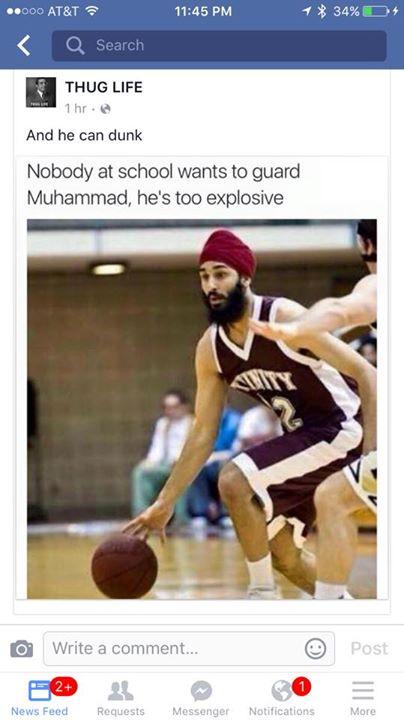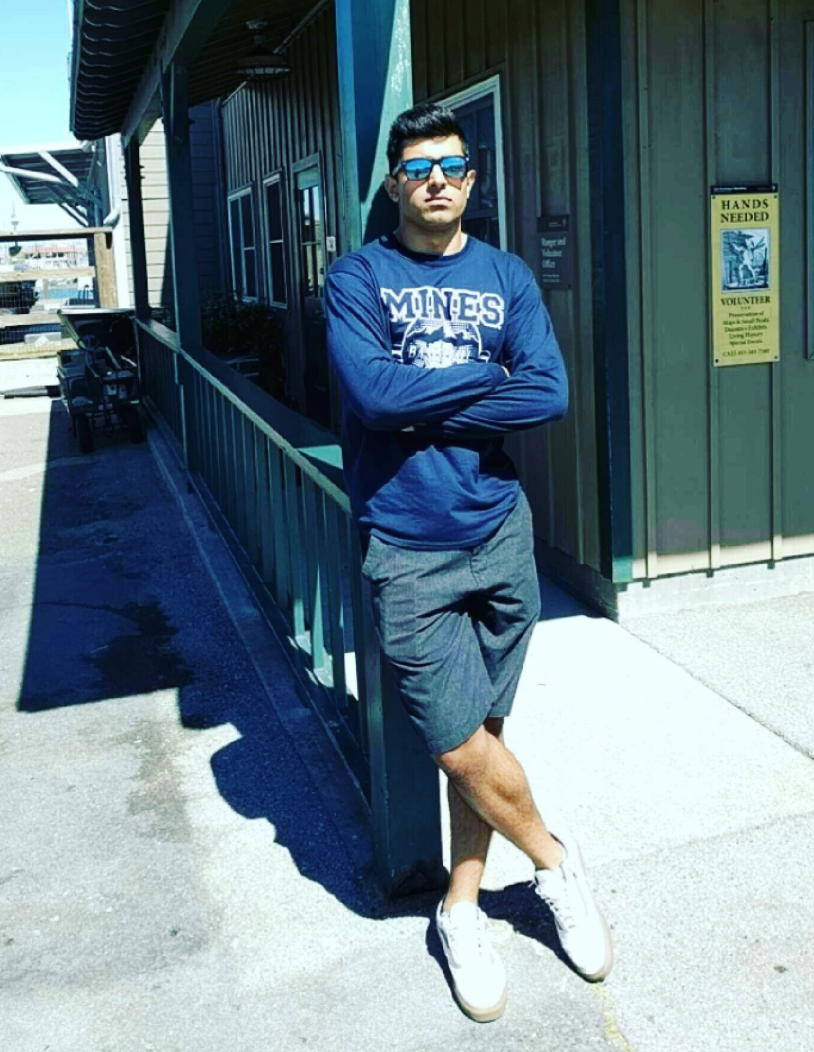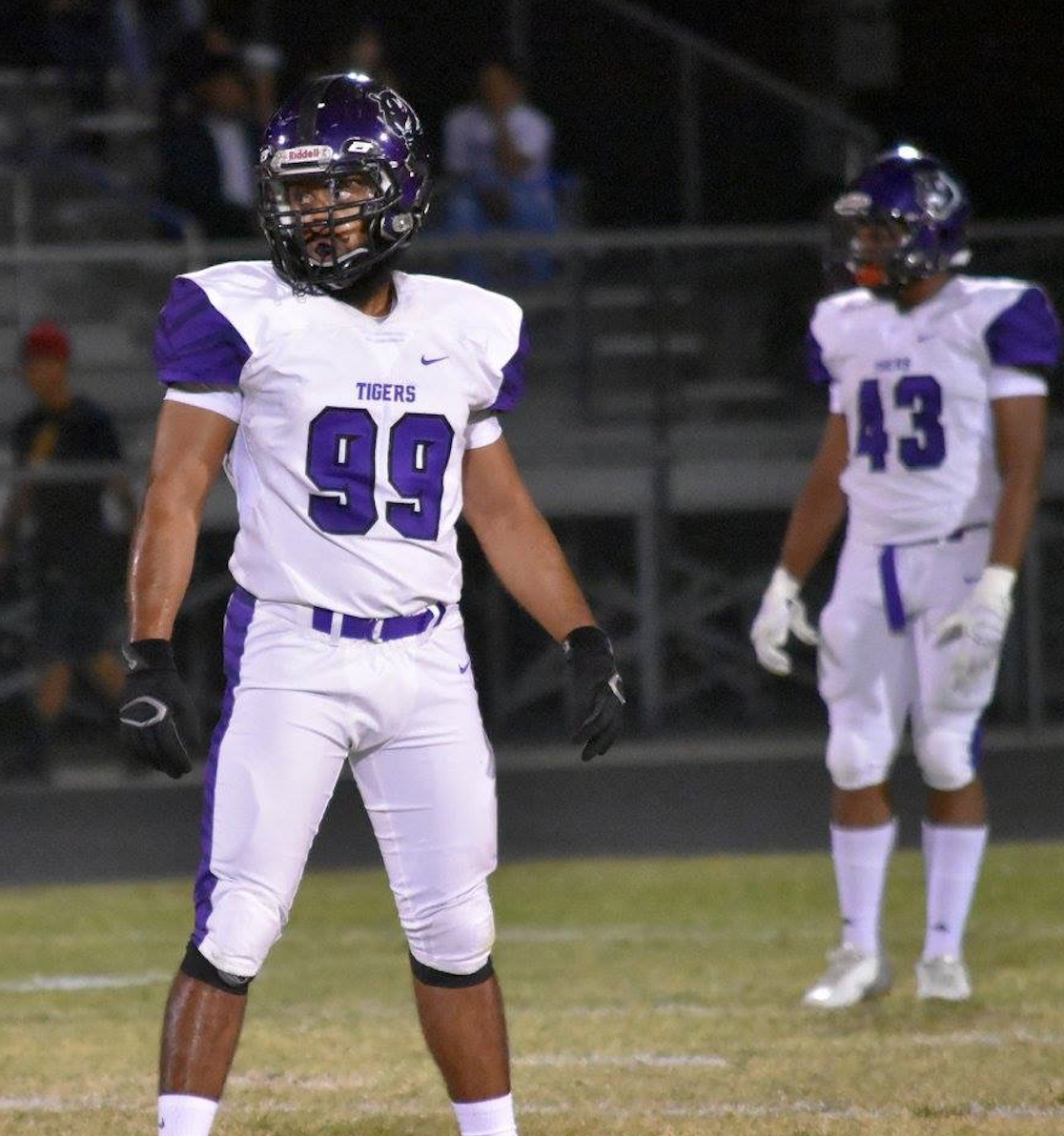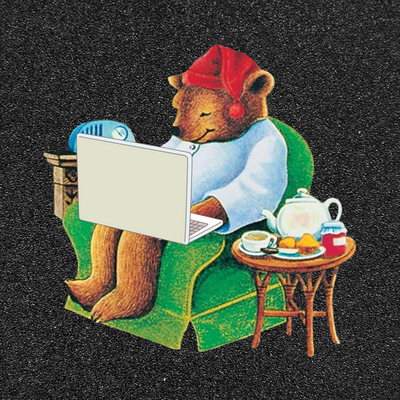Back in 2014, Darsh Singh stepped onto the NCAA court as the first-ever Sikh American basketball player the league had ever seen.
It wasn’t easy. Clad in a turban, he was targeted, experiencing his fair share of racism. At games, people would tell him to “go back to his country,” cut his hair, or take off his turban. But he persisted, petitioning to the NCAA to allow him to wear his turban, a vital part of him and his religion. The league determined it was okay, and he started playing for Trinity University with a matching turban tied around his head.
SEE ALSO: What turbans mean for Sikh American men
Which is when the real battle began. In the crowd there was jeering. On social media, racist comments that mistook him for Muslim. Someone made a meme with the caption: Nobody at school wants to guard Muhammad, he’s too explosive.

But through negativity came a social media movement that bubbled up. People started tweeting out #BeLikeDarsh, celebrating him and diversity. His friends came out to write against hate.
“I know this guy and his name’s not ‘Muhammad,’ wrote Darsh’s friend, Greg Worthington. “He’s not Arab, he’s Punjabi. He’s not even Muslim, he’s a Sikh. His name is Darsh Singh and he’s a US citizen, born and bred. That jersey he’s wearing in this pic, it currently sits in a Smithsonian Museum in Washington, DC because he made US history as the NCAA’s first turbaned Sikh-American basketball player for Trinity University in my hometown of San Antonio.”
While there has been positivity that came from this ordeal, it’s troubling to think that a lack of diversity in sports would lead to such ignorance. Which comes to the bigger issue at hand: There needs to be more diversity in sports.
But it doesn’t necessarily start and end with athletes, rather, translates to sports fans, coaches, agents, and more, who determine who should and shouldn’t be on their teams. Countless articles have pointed out how there’s a lack of people of color in decision-making positions. An article in the Bleacher Report summed up how all major league sports were egregiously lacking diversity with their coaches. We know by now that having a diverse array of men and women is essential to bringing fair opportunities to all types of people.
Which is perhaps why we, as American sports fans, don’t see many players who don’t fit that archetype of a “traditional” athlete in major league sports. There are few exceptions, like the Brooklyn Nets’ Jeremy Lin, one of the NBA’s only Asian Americans on its roster. Or the LA Chargers’ Younghoe Koo, one of the NFL’s only Asian American players. These men, like Darsh, face many setbacks with racism, skepticism and blatant hatred, following their every move.
We wanted to celebrate more diversity in sports and asked three Sikh Americans athletes to talk about their experiences. We hope that the more we normalize diverse guys, the less hateful the sports world will be.
For more information on Sikh Americans, check out WeAreSikhs.org for a wealth of resources.
Samrath Singh, 17, varsity baseball player, South Jersey Elite

Growing up as a Sikh is a blessing in and of itself. I have always enjoyed being outside and playing sports. It was difficult at times to play both baseball and wear a turban. I have been discriminated against because of my appearance, especially because I choose to only wear my turban while playing and not a baseball cap. I do this because I am proud of my religion and my faith and should I wear a cap, I would be uncomfortable and feel I would be hiding what defines me as a person, which is my turban. Being one of the only athletes who was Sikh was hard at first but once I grew close to my teammates, I never felt that I was different. Most of the people I have played baseball have known me from a very early age and by now we have a mutual respect for each other.
Since I play baseball, which is not a contact sport, my turban is never really an issue. I am always conscious of my turban but I don’t think that I have to take extra care of my turban. When I play recreational basketball, I make sure to be aware of others to make sure that my turban doesn’t get hit, but sometimes it is inevitable. If it was an accident, then I don’t have a problem.
I have been discriminated against because of my appearance, especially because I choose to only wear my turban while playing and not a baseball cap.
I notice people staring all the time. I also understand when they stare, they are not trying to be rude but actually are curious. For example, when I was playing the Perfect Game tournament in Georgia this summer, I sensed many of my opponents and viewers staring at me. I have been asked questions before, and I have learned to respond with patience. I used to get angry when people asked me questions because I thought Sikhism was widely known. Now, I understand that not very many people actually have been educated about Sikhism and it is my responsibility to change that.
I have felt moments where it was more difficult being a Sikh American in sports. Because of my turban and my appearance I have been asked if I was in the right sport. I have also been asked if I should be playing cricket instead. In fact, there was once a time where an umpire insisted that I definitely played cricket even when I told him multiple times that I did not. This happened during the game! I’ve also been called names such as a “terrorist” and other slurs but I try not to let those degrading comments affect me. Also, because I am a Sikh in sports, I feel that I have to prove I belong. I feel confident in my abilities and in how much I have grown as a player, and hopefully others respect me for that.
I think that there aren’t more Sikh American professional athletes because there is a large focus on academics within the Sikh community. Sikh parents might be wary of letting their children pursue sports because they believe that a high level of education is necessary. Taking on a lot of athletic responsibility risks lower grades and a shifted focus from studies. My parents, however, encourage the importance of a balance between both sports and education.
I have been on the varsity team since I was a sophomore and now I am starting my senior year. Throughout my life, I have played on various travel teams but this past summer I played on a showcase team called the South Jersey Elite. We traveled to Georgia for the 17u Perfect Game tournament and for other tournaments such as Diamond Nation tournaments in Flemington, New Jersey. I am continuing to play with them this fall. After this past summer season, I committed to play D1 college baseball at Boston College which is in the ACC.
I hope to inspire other young Sikhs to pursue their passion in sports. I want to show that it’s possible to excel in many areas through hard work and perseverance.
Monty Khela, 19, basketball, Case Western Reserve University

Growing up, I noticed that the sports field was dominated by other races. I felt it really wasn’t for Asians, for reasons as our physique and just wasn’t something Asians pursued since they wouldn’t be successful. Many of our Sikh American students lack confidence as well as support from their families/community [at an early age]. Lack of confidence begins early on – kids begin to feel that they are not talented and do not fit in the sports which comes from peers and the community. Some parents do not support their kids as they know they will face many challenges along the way. The dream never evolves.
— Monty Khela (@monty_khela) January 8, 2017
Ever since I was in 5th grade, I wanted to play basketball. I asked my parents if I could join the Amateur Athletic Union (AAU). They were not aware of AAU and found out more about it. I tried out and made the team. From that point, my basketball career began. And being the only Sikh American on my teams, I faced many challenges and obstacles. Being a minority in sports, one has to work extra hard to be given an equal opportunity. With my father’s support, I continued to play and gained the confidence I have today to pursue my dreams. I was taught to balance my education and passion. Without keeping stellar grades, I was not allowed to play. This taught me responsibility and time management skills. I managed to keep my grades up and was able to play. I also faced problems along the way and learned some very important lessons in life. My father taught me to stand up for yourself and what you believe. Without his support, I would have quit. Being Sikh, I learned to do no wrong to others and if anyone does wrong to you, stand up for yourself.
I would like to be a role model for young Sikh Americans that have a desire and dream to play sports at any stage, whether it be in middle school, high school or at the college level. I am proud to be a Sikh American and would like for Sikhs being given equal opportunity.
I hope that athletes are given equal opportunity and are able to fulfill their dreams and passions. Any athlete should be confident and follow their dreams.
Harkaran Sodhi, 17, Goodyear, AZ, Football and Track & Field, Millennium High School

I have always been intrigued with bodybuilding and sports after watching my elder brother run track and workout. I slowly started to learn from my brother and joined a 7on7 traveling club football team called FuturePro. I had no experience with tackle football whatsoever and did not know the rules, but I worked every day, day and night hoping to achieve my dream to play in the NFL.
While playing in club and high school teams, I have always been asked about my turban, my hair, my beard, my Kara (steal bracelet), and my whole personality, to which I’d always respond: “I love it!” I have never been ashamed of my personality, rather I embrace it and teach others. Most of the time people find my religion and personality intriguing and want to learn more. Since I look different from everyone else, I clearly stand out. It’s one way I feel people can find me easily and ask me for any help they may need. I always help them out.

For my sports, I tie my hair in the back in a braid with small a patka on that so that I can wear the football helmet. It is not hard for me and I can easily adjust to it, while keeping my Sikhi personality and my hair protected.
I never felt it be difficult to be a Sikh American and play in sports, but rather I always felt proud.
People do stare sometimes and ask questions about my hair and kara but it’s the article of my faith and I am proud of it. I feel it’s a sign of dominance, aggressiveness, leadership and maturity. I always tell them how positive I feel about that and tell them the ways of growing it.
I never felt it be difficult to be a Sikh American and play in sports, but rather I always felt proud. I feel dominant with my beard and muscular strength. The mascot of my team is a tiger and when I get ready with my turban and the football uniform I really feel like tiger, and have extra strength to play hard.
Actually, I think it’s the personal interest to become athletes, the passion and dedication from inside. But yes, I should like to convey my Sikh American friends that you should not be afraid of comments of people about your beards and long hair, but rather feel proud of your personality and come forward. We can tell people about our faith and win many hearts.
My goal is to create a name for myself so big that everyone will know about me and my personality. That way others who look different from the crowd will not be ashamed or embarrassed to come out and play.






